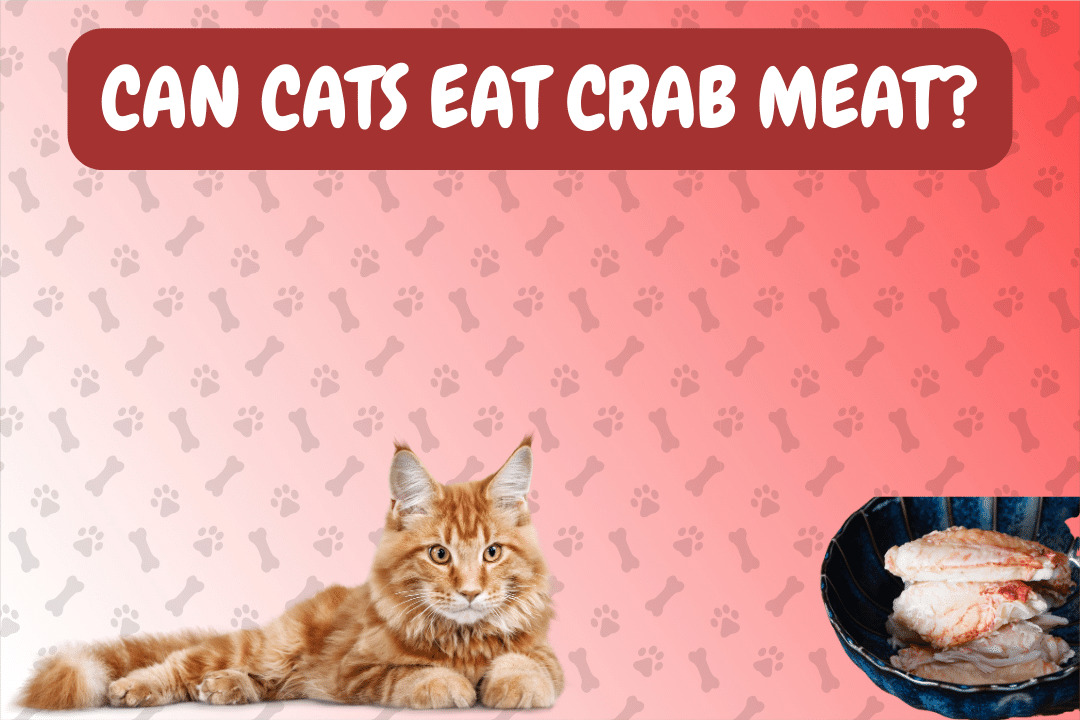No, cats can’t eat crab meat because it poses several risks to their health.
Table of Contents
Introduction
Cats are curious creatures with a taste for exploration, and they may show interest in various foods, including seafood like crab meat. While it’s tempting to share our meals with our feline companions, it’s essential to know which foods are safe for them. In this article, we will explore whether cats can safely consume crab meat, delving into its nutritional aspects, potential risks, safe serving practices, alternatives, special considerations, and expert insights to help you make informed decisions about your cat’s diet.
Nutritional Value
Crab meat is a seafood delicacy cherished by many humans for its unique flavor and nutritional value. It is rich in protein and contains essential vitamins and minerals such as vitamin B12, zinc, and phosphorus. However, cats have specific dietary requirements primarily focused on high-quality cat food. While crab meat is nutritious, it doesn’t provide the balanced nutrition that cats need.
Potential Risks
Feeding crab meat to cats carries several potential risks. Firstly, it can lead to digestive upset, including diarrhea and vomiting, as cats may have difficulty digesting seafood. Secondly, crab meat often contains high levels of sodium and spices, which can be harmful to cats and may lead to salt poisoning or other health issues. Additionally, crab shells and cartilage can pose a choking hazard or cause digestive blockages in cats.
How to Serve Safely
To ensure your cat’s safety, it’s best to avoid feeding them crab meat altogether. Instead, stick to high-quality commercial cat food that meets their specific nutritional needs. If you still want to share a special treat with your cat, consult your veterinarian for safe alternatives.
Serving Suggestions
If you’re looking to treat your cat, consider offering small pieces of plain, cooked, and unseasoned chicken or fish as an occasional treat. Always ensure that the food is thoroughly cooked and boneless to prevent choking hazards or digestive issues.
Special Considerations
Cats have unique dietary requirements, and their bodies are adapted to a diet that includes specific nutrients found in cat food. Straying from their regular diet can lead to nutritional imbalances and potential health problems. Additionally, some cats may have allergies or sensitivities to seafood, making it even more crucial to avoid crab meat.
Expert Opinion
Veterinarians and feline nutrition experts unanimously discourage feeding crab meat to cats due to the potential risks it poses. They emphasize the importance of sticking to a balanced and species-appropriate cat food diet to ensure your cat’s optimal health.
Conclusion
In conclusion, cats should not be fed crab meat due to the multiple risks associated with its consumption, including digestive upset, sodium intake, choking hazards, and the absence of essential nutrients for cats. To provide the best care for your feline friend, stick to a high-quality cat food diet designed to meet their specific nutritional requirements.
FAQ
Q1: Can cats eat other types of seafood?
A1: While some cats may tolerate small amounts of seafood, it’s generally not recommended due to the potential for digestive upset and allergies. Stick to specially formulated cat food for their dietary needs.
Q2: What should I do if my cat ingests crab meat accidentally?
A2: If your cat consumes crab meat accidentally and experiences symptoms like vomiting or diarrhea, contact your veterinarian immediately for guidance.
Q3: Are there any safe human foods to treat my cat with?
A3: Plain, cooked, and unseasoned chicken or fish can be safe occasional treats for cats if offered in moderation. Always consult your veterinarian before introducing new foods into their diet.
Q4: Can cats eat crab shells or cartilage?
A4: No, cats should not consume crab shells or cartilage, as they can pose choking hazards and may lead to digestive blockages.
Q5: What are the signs of salt poisoning in cats?
A5: Signs of salt poisoning in cats may include excessive thirst, vomiting, diarrhea, lethargy, and seizures. If you suspect salt poisoning, contact your veterinarian immediately.
Q6: Can cats eat canned crab meat?
A6: It’s best to avoid feeding cats canned crab meat, as it often contains high levels of sodium and spices that can be harmful to them.
Q7: Can cats eat raw crab meat?
A7: Feeding cats raw seafood, including raw crab meat, is not recommended due to the risk of bacterial contamination and parasites that can be harmful to cats.
Q8: Are there any benefits to feeding cats seafood?
A8: Seafood is not necessary for a cat’s diet, and their nutritional needs are best met with high-quality cat food formulated to provide all essential nutrients.
Q9: Can cats eat crab meat if it’s thoroughly cooked and without seasoning?
A9: While thoroughly cooked and unseasoned crab meat may be less risky, it is still not recommended due to the potential for digestive issues and the absence of essential cat-specific nutrients.
Q10: Are there any cat-friendly alternatives to crab meat?
A10: Treat your cat to specially formulated cat treats or catnip toys as a safer and more suitable alternative to human foods like crab meat. Always prioritize their regular cat food diet for their nutritional needs.
For more Cats food informations, visit our blog.
Hello! I’m Max Walley, a pet enthusiast who knows a lot about what our animal buddies can munch on and what’s a no-no. With ‘canpeteat.it,’ I’m here to help pet owners make smart food choices. Come with me as we dive into the world of pet nutrition, discovering what keeps our furry pals joyful and in tip-top shape. Let’s explore this adventure together!


